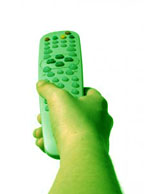
In 1971, children started watching TV, on average, at age 4. Today, despite
warnings from the Canadian Paediatric Association and their American counterpart
that children under age 2 should not be watching television, the average
starting age is just over 4 months.
Dr. Dimitri Christakis, a Seattle paediatrician, armed with 25 years worth of
research, is again sounding the alarm on television and infants. "There is now
an obsession with having smart kids," says the doctor. But, ‘smart DVDs’ and
even award winning shows like Sesame Street can do more harm than good,
according to Christakis’ research, and may even be, in part, responsible for
some of the tenfold increase in cases of ADHD over the last two decades.
The strong evidence that too much TV too early is affecting infants’ brains has
caused France, for instance, “to curtail the broadcasting of shows aimed at
children under 3.” But with baby DVDs being a $500 million dollar business in
the US alone, and millions of marketing dollars being put behind the push, there
is a lot of interest in having parents believe, with no scientific proof, that
they are advancing their children by having them sit in front of the TV from a
very young age.
While not labelling TV an evil, at least one doctor is very eager to have us
hear beyond the loud boom of the marketing dollars. And as parents or anyone
with an interest in the generations of the future, we are obliged to consider
fact over rhetoric, developmental appropriateness over entertainment fetish. And
often children don’t want to be entertained; they simply want to explore. So let
us explore new ways together, letting our children’s sense of wonder be an
inspiration and a guide for us.